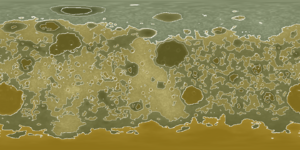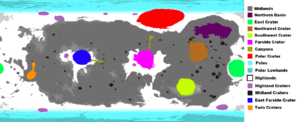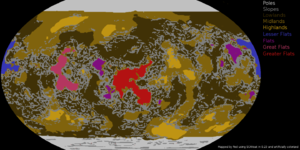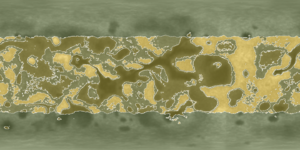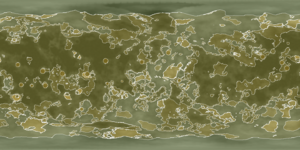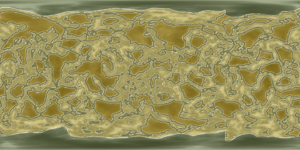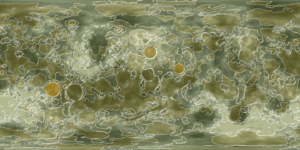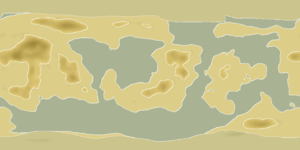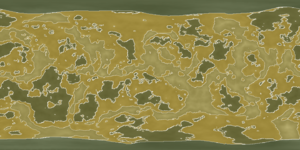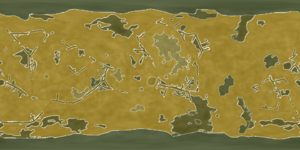Biome
In Kerbal Space Program a biome is a geographic area on the surface of a celestial body typically corresponding with types of geology like mountains or craters. This is in contrast to the real meaning of the term in which biomes are biotic communities in contiguous areas with similar climatic conditions and organism populations.
The results of science activities often differ when performed in different biomes, and thus provide more opportunities to earn Science Points in Career Mode to research further along the technology tree. In Sandbox, even the text descriptions from experiments are unavailable, rendering biomes unimportant. For details and tips on how to get as much Science as possible from exploring biomes (and where to find water in a Mountain biome, for example), see the Science Tutorial.
Areas belonging to a biome may be geographically separate, but they're not considered different areas. For example, after performing an EVA Report at Kerbin's north polar IceCap biome, performing one from the southern IceCap gives the same results (and Science Points) as if it had been performed a second time in the northern IceCap.
With version 0.90 biomes were added to all celestial bodies which have a solid surface, which excepts Jool and the Sun. Before that only the Kerbin system - Kerbin, Mun and Minmus - had biomes. Jool's moon Laythe and the planet Eve have bodies of water and science activities performed in them stated as being from "Laythe's oceans" and "Eve's oceans". However, this was just the effect of the situation "SrfSplashed" for a splashdown versus the usual "SrfLanded" surface landing.
Contents
Kerbol
The star Kerbol (officially called “The Sun”) has no biomes. Any attempt to land on its surface will result in the craft overheating, and ultimately exploding.
Moho
The planet Moho has 12 biomes. It is one of two bodies (the other being Ike) that have their own North and South Pole biome. On the North Pole there is a big sinkhole called the Northern Sinkhole.
Moho biome list
- North Pole
- Northern Sinkhole Ridge
- Northern Sinkhole
- Highlands
- Midlands
- Minor Craters
- Central Lowlands
- Western Lowlands
- South Western Lowlands
- South Eastern Lowlands
- Canyon
- South Pole
Eve
The planet Eve has 7 biomes. It has several Explodium Seas, among which lie large continents.
Eve biome list
- Poles
- Explodium Sea
- Lowlands
- Midlands
- Highlands
- Peaks
- Impact Ejecta
Gilly
With only 3 biomes, the moon of Eve, called Gilly, has the fewest number of biomes.
Gilly biome list
- Lowlands
- Midlands
- Highlands
Kerbin
The planet Kerbin has 9 biomes, plus a large number of surface-only “location biomes” comprising Kerbal Space Center. Roughly 60% Kerbin's surface is Water biome. Grasslands and Highlands biomes cover most of the land area.
Kerbin is the only celestial body with location biomes: the grounds of KSC and the many structures it is composed of. Each count as a biome only with experiments performed on the surface. KSC is within a Shores biome, so experiments while flying at any altitude over the KSC count as Shores. However, it is possible to get an "EVA Report while flying over" the area, either while jumping, grabbing a ladder on a craft, or sitting on a EAS-1 External Command Seat.
Kerbin biome list
- Ice Caps
- Tundra
- Highlands
- Mountains
- Grasslands
- Deserts
- Badlands
- Shores
- Water
- KSC
- Administration
- Astronaut Complex[Note 1]
- Crawlerway
- Flag Pole
- LaunchPad
- Mission Control
- R&D
- R&D Central Building
- R&D Corner Lab
- R&D Main Building
- R&D Observatory
- R&D Side Lab
- R&D Small Lab
- R&D Tanks
- R&D Wind Tunnel
- Runway
- SPH
- SPH Main Building
- SPH Round Tank
- SPH Tanks
- SPH Water Tower
- Tracking Station
- Tracking Station Dish East
- Tracking Station Dish North
- Tracking Station Dish South
- Tracking Station Hub
- VAB
- VAB Main Building
- VAB Pod Memorial
- VAB Round Tank
- VAB South Complex[Note 2]
- VAB Tanks
Notes: While the per-area biomes are available from the start of a new career game, the per-structure biomes will not be found until each facility is upgraded once or twice. To access each per-structure biome, your craft needs to be touching each new building.
- ↑ In career mode, the Astronaut Complex location biome is available with a first-level building if in contact with the structure, or anywhere on its hex after the first upgrade.
- ↑ The South Complex location biome is only accessible with a second-level VAB, making the science available there missable content.
Mun
The biggest moon of Kerbin, called the Mun, has a total of 15 biomes, 7 of which are uniquely named major craters. The Mun has the largest amount of biomes in the Kerbol System. Most of the surface area belongs to the Midlands biome followed by the Highlands. Canyon biomes extend off a few major craters.
Mun biome list
- Poles
- Polar Lowlands
- Polar Crater
- Highlands
- Highland Craters
- Midlands
- Midland Craters
- Northern Basin
- Northwest Crater
- East Farside Crater
- Canyons
- Farside Crater
- East Crater
- Twin Craters
- Southwest Crater
Minmus
The moon of Kerbin, called Minmus, has a total of 9 biomes. The most distinctive quality of Minmus's biomes is the variety of Flats, which in-game text describe as “lake beds”. They are almost perfectly flat and may represent salt flats. Roughly two-thirds of the surface area is irregular terrain transitioning between Highlands, Midlands, and Lowlands with Slopes in-between.
Minmus biome list
- Poles
- Lowlands
- Midlands
- Highlands
- Slopes
- Flats
- Lesser Flats
- Great Flats
- Greater Flats
Duna
The planet Duna has 5 biomes.
Duna biome list
- Poles
- Highlands
- Midlands
- Lowlands
- Craters
Ike
The moon of Duna, called Ike, has 8 biomes. It is one of two bodies (the other being Moho) that has their own North and South Pole biome.
Ike biome list
- Polar Lowlands
- Midlands
- Lowlands
- Eastern Mountain Ridge
- Western Mountain Ridge
- Central Mountain Range
- South Eastern Mountain Range
- South Pole
Dres
The planet Dres has 8 biomes.
Dres biome list
- Poles
- Highlands
- Midlands
- Lowlands
- Ridges
- Impact Ejecta
- Impact Craters
- Canyons
Jool
The planet Jool has no biomes, since it is a gas giant and therefore landing on its surface is not possible.
Laythe
The first moon of Jool, called Laythe, has 5 biomes. Laythe exists of a huge ocean, called The Sagen Sea, with some small Dunes and Shores biomes. It also has bay, called the Cresent Bay and a Poles biome.
Laythe biome list
- Poles
- Shores
- Dunes
- Cresent Bay
- The Sagen Sea
- Poles
- Highlands
- Midlands
- Lowlands
- Highlands
- Midlands
- Lowlands
- Mara
- Minor Craters
- Major Crater
- Major Crater
- Major Crater
- Poles
- Slopes
- Peaks
- Mara
- Valley
- Ridges
- Poles
- Lowlands
- Midlands
- Highlands
- Poles
- Glaciers
- Midlands
- Lowlands
- Ice Canyons
- Highlands
- Craters
- Answer in “List of places and biomes in KSP (planetary geology & geography) - UPDATING FOR v0.90” by Olympic1
Vall
The second moon of Jool, called Vall, has 4 biomes.
Vall biome list
Tylo
The third moon of Jool, called Tylo, has 8 biomes. Three biomes have the exact same name but are seen separately in KSP. It is unknown if this is a bug, a failed reference to the novel Catch 22, or was simply overlooked by Squad.
Tylo biome list
Bop
The fourth moon of Jool, called Bop, has 5 biomes.
Bop biome list
Pol
The fifth moon of Jool, called Pol, has 4 biomes.
Pol biome list
Eeloo
The planet Eeloo has a total of 7 biomes.
Eeloo biome list
